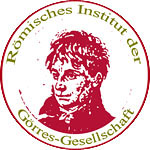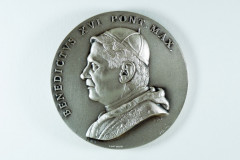Benedict XVI about deworldliness, secularisation and secularizing trends
from Johannes Grohe
Benedict XVI: "History comes to the aid of the Church in a certain way through the vari-ous periods of secularization, which have contributed significantly to her purification and inner reform".
Pope Benedict had a positive view of history, including those human events that in one way or another lead the Church back to her mission. In an important speech during his third trip to Germany, which he gave in Freiburg for Catholics involved in church and society, he spoke about the need for reform in the church in the face of the crisis of faith and the increasing alienation of many people from the life of the church. In this context, he urged the Catholic Church in Germany (and beyond), under the concept of Entweltlichung (deworldliness: effort to detach from the tendency towards worldliness), not to rely too much on worldly privileges and to fulfil its mission in the world more consistently.
At the time, Benedict XVI was either not fully understood or people did not want to understand him, also because secularisation in its various aspects is linked in his state-ments. In an article from 2021, he stated: “Whether the word Entweltlichung, which comes from the vocabulary coined by Heidegger, was wisely chosen by me in Freiburg as the final keyword, I do not know” (Herder-Korrespondenz, August 2021).
In this address, the Pope had wanted to describe the negative part of the movement, “namely, the stepping out of the discourse and the constraints of a time into the freedom of faith” (ibid.). In this sense, there were moments in history when the Church received privi-leges from the state: in the 4th century, for example, with the Constantinian shift, which ini-tially granted the Church freedom of religious practice, then increasingly favoured it, and at the end of the century under Theodosius I, it effectively became the state religion, or, to give another example, when Emperor Otto I created the imperial church system of the Middle Ages, in which ecclesiastical dignitaries became prince-bishops, prince-abbots, and so on. These moments can lead to a secularisation / worldliness of the church, which – at least in some respects – can obscure its actual mission. The historical epoch of secularisation must be distinguished from these “secularisations”, since it means exactly the opposite: the expropriation of the Church from its ownership and privileges.
“In the concrete history of the Church, however, a contrary tendency is also manifested, namely that the Church becomes self-satisfied, settles down in this world, becomes self-sufficient and adapts herself to the standards of the world. Not infrequently, she gives great-er weight to organization and institutionalization than to her vocation to openness towards God, her vocation to opening up the world towards the other.
In order to accomplish her true task adequately, the Church must constantly renew the effort to detach herself from her tendency towards worldliness and once again to become open towards God. In this she follows the words of Jesus: ‘They are not of the world, even as I am not of the world’ (Jn 17:16), and in precisely this way he gives himself to the world. One could almost say that history comes to the aid of the Church here through the various periods of secularization, which have contributed significantly to her purification and inner reform.
Secularizing trends – whether by expropriation of Church goods, or elimination of privileges or the like – have always meant a profound liberation of the Church from forms of worldliness, for in the process she as it were sets aside her worldly wealth and once again completely embraces her worldly poverty. In this she shares the destiny of the tribe of Levi, which according to the Old Testament account was the only tribe in Israel with no ancestral land of its own, taking as its portion only God himself, his word and his signs. At those moments in history, the Church shared with that tribe the demands of a poverty that was open to the world, in order to be released from her material ties: and in this way her missionary activity regained credibility.
History has shown that, when the Church becomes less worldly, her missionary wit-ness shines more brightly. Once liberated from material and political burdens and privileg-es, the Church can reach out more effectively and in a truly Christian way to the whole world, she can be truly open to the world.”
Benedikt XVI, in Freiburg i.Br., 25. September 2011. the complete text of the address
- Details
- Written by: Stefan Heid
- Category: From around the world
 Römisches Institut der Görres-Gesellschaft
Römisches Institut der Görres-Gesellschaft







